Another Mapping of Art and Politics. The Archive Policies of Red Conceptualismos del Sur
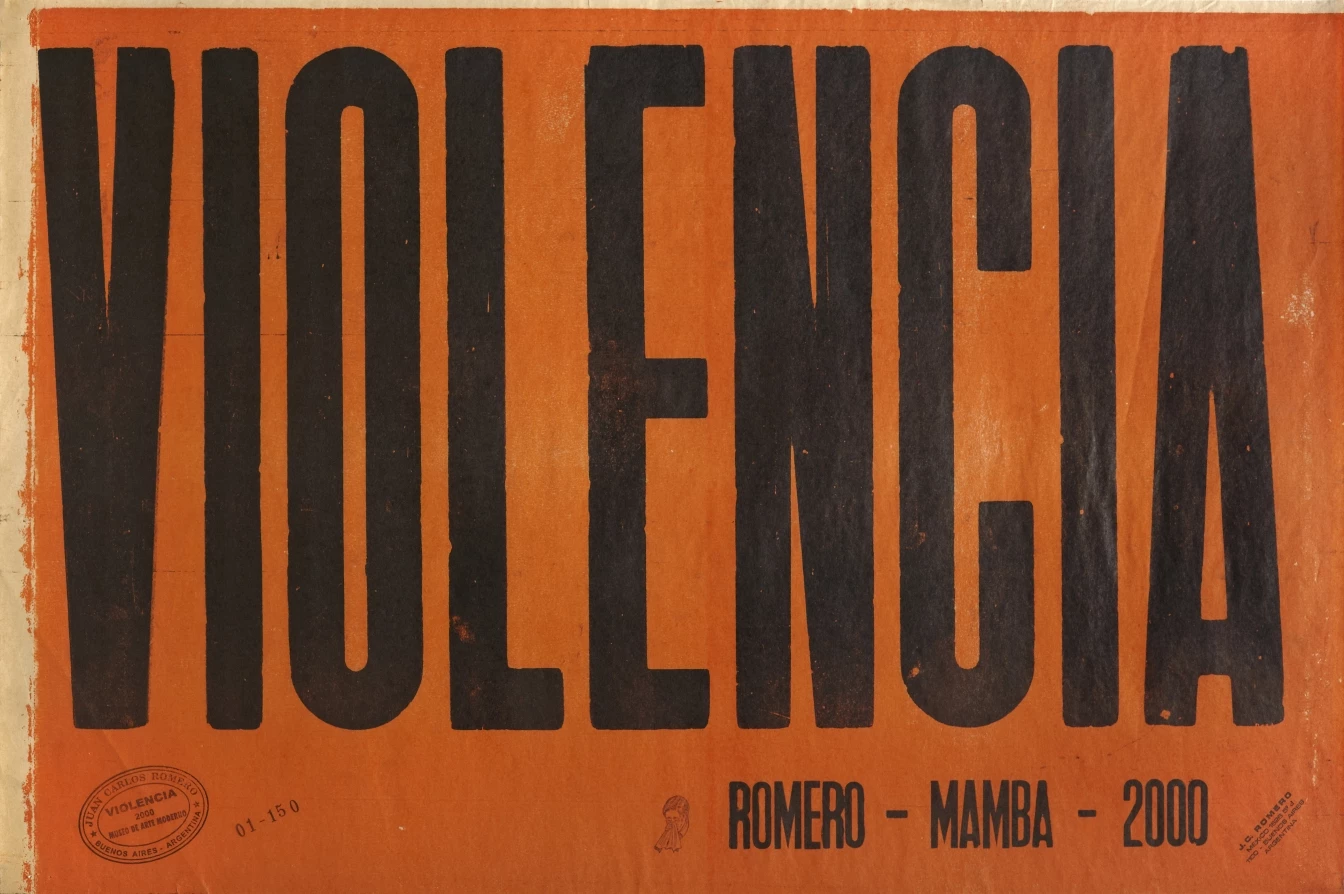
Juan Carlos Romero, Violence, poster, 2000. Part of the Archive of artists Juan Carlos Romero.
Red Conceptualismos del Sur (known as RedCSur or the Southern Conceptualisms Network) is an international platform of work, thought and collective positioning that currently has over 50 members in different countries of Latin America, Canada and Europe. It was founded at the end of 2007 by a group of researchers and artists with concerns over the need to politically intervene in the processes of neutralising the critical potential of a set of what we could call conceptual practices that took place in Latin America from the 1960s onwards. Today, the network functions in four nodes (Research, Archives, Publications and Web), which enable us to operate in diverse formats or spaces of collective work. The network has held so far three plenary meetings (Brazil, 2007; Argentina, 2008; and Chile, 2009) to discuss our Founding Manifest, and outline our major working guidelines. Due to the difficulties of gathering so many people, we have opted for virtual meetings (plenary once a year, and node meeting once a month) and the annual election of delegates charged with the general coordination of the Network. We have also carried out several collective projects, such as a collective research project on art and politics in Latin America in the eighties called Losing the Human Form (including an itinerant exhibition in Madrid, Lima and Buenos Aires, and a "glossary" volume published in Spanish and English), among others.
RedCSur considers that, as is the case in other emancipatory projects, the catalysing potential of the so-called "conceptual practices" was broken up by the force of State violence and market logic. The different attempts to reactivate this disruptive power have been interrupted by the continual overlap of diverse mechanisms: the inoculation of collective memory from State systems; the defensive oblivion assimilated by civil society; the depoliticisation of subjectivities in restructuring neo-liberal economies; the aestheticisation of counterculture, etc. More than forty years on from the outbreak of dictatorships in a significant part of Latin America, the ensuing traumatic effect still smothers intellectual life in our societies and immunises the poetic-political potential of those experiences.
RedCSur stemmed from the will to contribute to this critical power. Our main objective, therefore, is to vindicate the presence of sensitive memory in those experiences in order for them to become an antagonistic force inside the framework of contemporary cognitive capitalism.
RedCSur is aware that museums, collectors and public and private art institutions participating in the international contemporary art system are in the midst of a strong dispute over visibility, belonging, the management of such artistic and political experiences and the accumulation of cultural heritage. Therefore, it is no mere coincidence that for some years now we have been witnessing a general process of institutionalisation and canonisation of archives, documents and other material and immaterial remnants from these conceptual practices. Our aim is to reconnect the aforementioned experiences in order to reactivate their catalysing potential, and as a starting point in the need to influence this area so as to revert these and other neutralisation strategies.
Faced with the pressing need to critically influence the current situation, RedCSur upholds an ethical and political commitment to the revaluation of all archives on critical artistic practises from Latin America (placing particular stress on those from the period spanning the 1970s and 1980s), which, due to their material conditions, are placed in a precarious position, or are dispersed and cannot be consulted publicly. We set out to defend their inalienable state – namely, their integrity and indivisibility – to generate conditions for their preservation and their availability for consultation by all interested parties, in addition to fostering their local registration wherever experiences occur that are encompassed in the archive by way of alliances with public institutions with an unflinching commitment to the same principles.
In association with diverse local and international agents (universities, museums), these principles have enabled us to set in motion the institutionalisation of diverse artists' archives, for instance those from the Uruguayan artist Clemente Padín, the Chilean group CADA (Colectivo de Acciones de Arte/ Art Action Collective), the Argentinian artist Juan Carlos Romero (which joins documentary holdings from various other artists), the Argentinian artist Graciela Carnevale, the archive Memories of Resistance, which brings together a series of graphic art practices in opposition to General Pinochet's dictatorship, and the Paraguayan artist Cira Moscarda, to name a few.
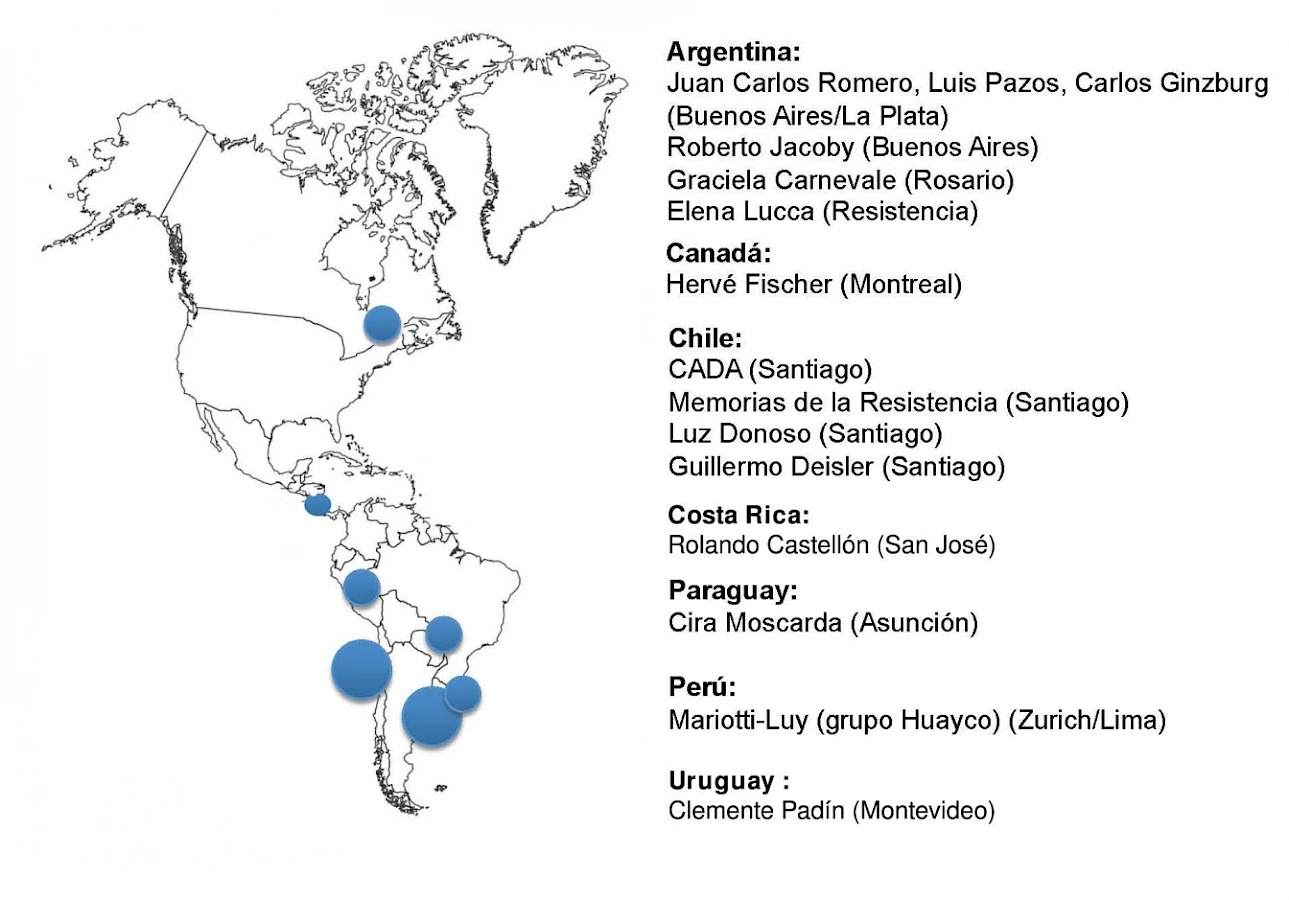
Archives which RedCSur is currently working on.
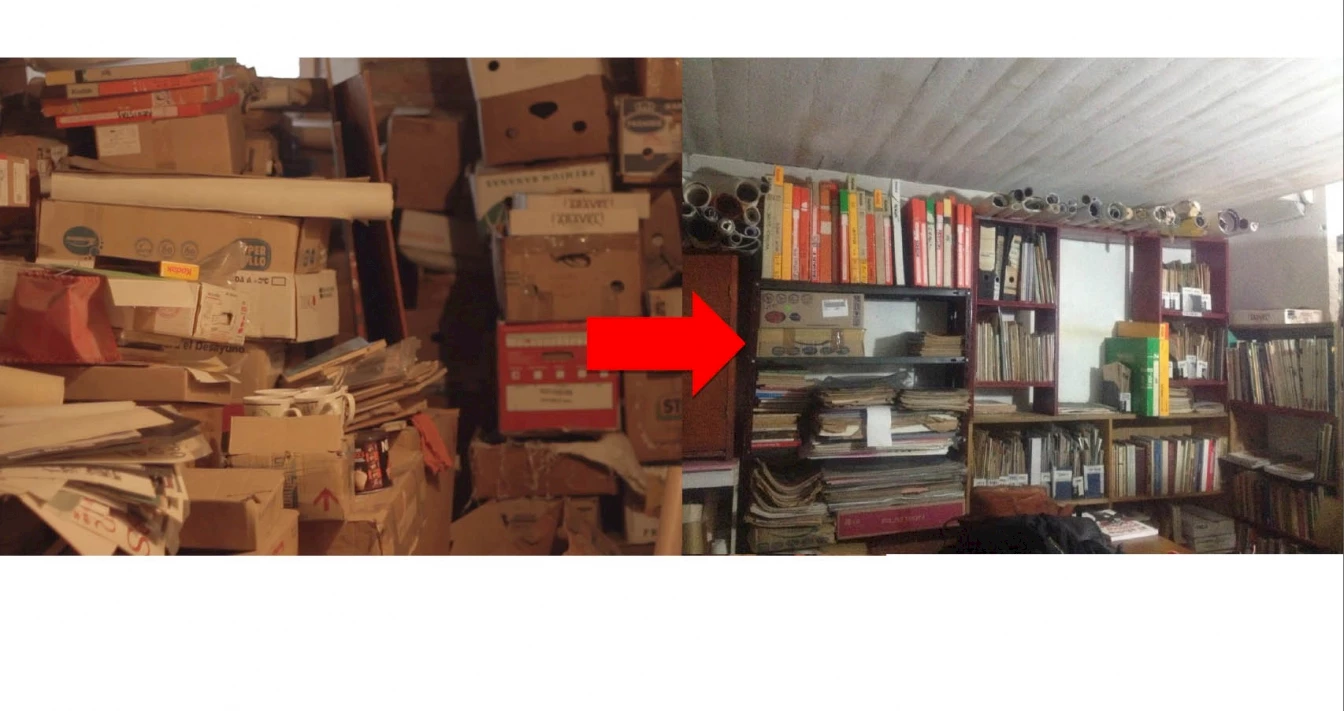
R. Archivo de la Resistencia Visual 1973–1989, Chile (R. Archive of Visual Resistance 1973–1989, Chile). Inventory, digitalization, preservation (Project in progress).
This is the way in which we seek to generate and support initiatives for the establishment, preservation and right to use document archives linked to the said experiences, and we aim to set in motion a circuit of Network Archives that share and facilitate public access to documents. We believe in the pressing need for collective and decisive intervention to put a stop to the continual expropriation, dispersion and destruction of documents and collections. We feel that the policies for forming archives must not only be concurrent with an acknowledgement of the effects of colonialism, but also with the persistence of colonialism in Latin America.
We lay stress on – even more so in the current political climate across a number of the continent's countries – the urgent need to generate State policies and common efforts that are synchronised and coordinated and strive to establish a network of public and decentralised archives.
These objectives of our archive policies cannot be taken into consideration without interactions with other approaches in our work that are inseparable from one another:
Research policies. We take research to be, above all else, a political and not merely an academic exercise. For us research is to restore, name and generate meaning around a set of poetic-political experiences whose critical power has been nullified. This means facing up to and taking charge of the tensions brought about by policies of neglect, and also addressing the implementation of thought and creation in a context of cognitive capitalism. Therefore, RedCSur endeavours to undertake a critical and active part in the geopolitical diagramme of global forces in the cultural economy.
Producing the memory of experience. Tracing, joining, organising and reinterpreting the documents produced by the aforementioned experiences is necessary but not enough, for these tasks by their very nature only enable access to formal outward appearances and commonplace representations. To unblock their interrupted critical power, there is a need to confront their immaterial memory; therefore, it is essential to recover the sensitive register of the experience and the attachments that arise as a direct form of intervention in neglect. This also entails rehabilitating the disruptive force from the cultural context containing the conditions of possibility.
Activation experiments. We want to generate action strategies that update the polluting and catalysing power of these experiences, which involves moving beyond their mere visibility, not solely because these practices are irreducible in their mere objectuality, but because we are more concerned with vividly connecting them to the present. We want to create a new laboratory of experimentation with the ability to encompass publications, exhibition projects, public discussions and museum initiatives. Regardless of the format, these interventions endeavour to set up different notions of history, heritage and the transmission of knowledge and duly questioned powers.
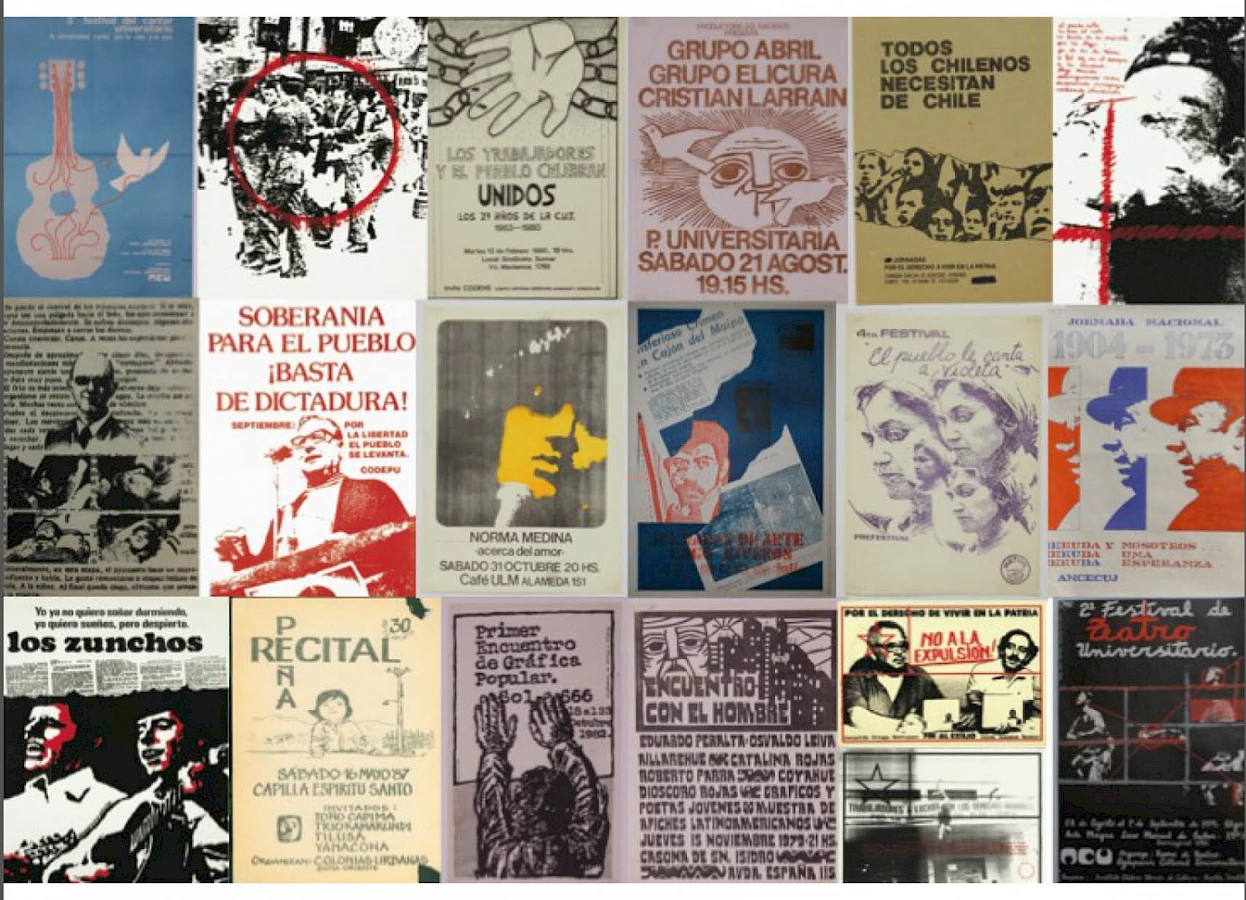
R. Archivo de la Resistencia Visual 1973–1989, Chile (R. Archive of Visual Resistance 1973–1989, Chile). Courtesy: Antonio Cadima (Tallersol), Havilio Pérez (APJ), Cucho Márquez (APJ).
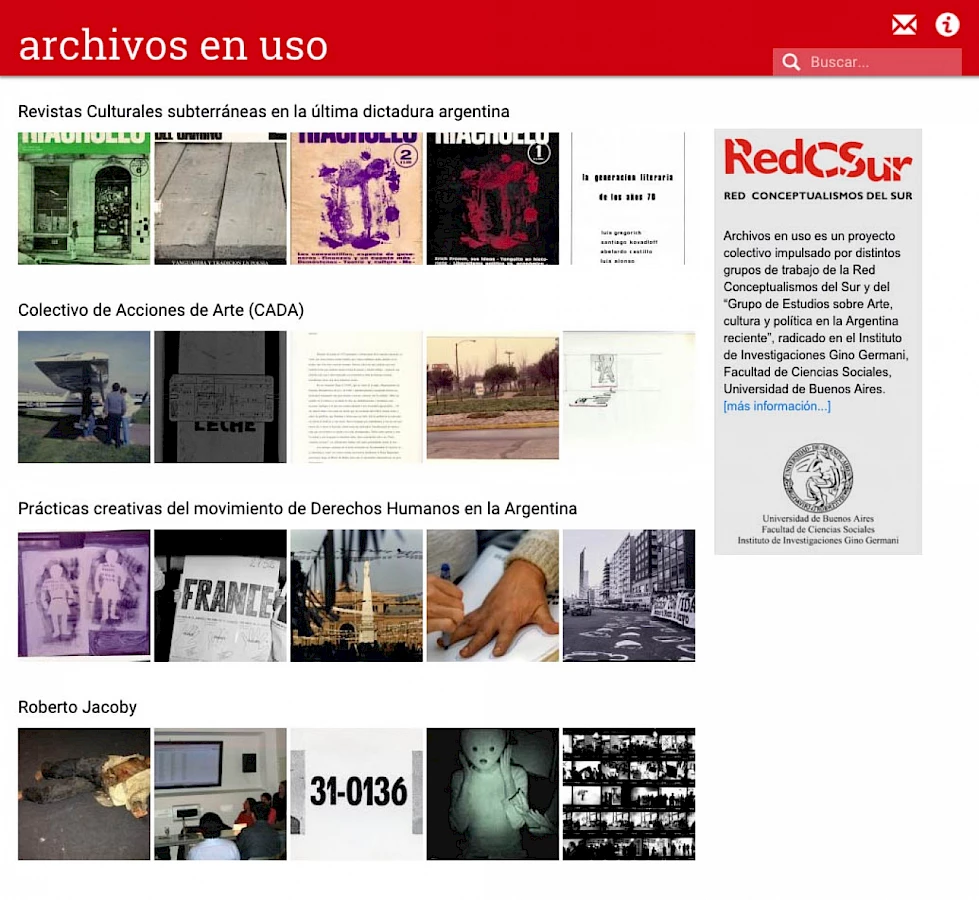
Archivos en Uso' platform.
A key commitment for RedCSur is advocating the collectivisation of materials, and we look to devise collectivisation devices and to disseminate archives that flow beyond artistic realms. As a result, we have promoted Archives in Use, an experiment that strives to grant availability and public access to archives from research projects set up by RedCSur, and those that are in collaboration with other platforms, for instance the Study Group on Art, Culture and Politics in Argentine Recent History, from the Gino Germani Research Institute of the Faculty of Social Sciences at the University of Buenos Aires. In addition to online consultation, Archives in Use are also free of charge and available either temporarily or permanently on computers in libraries, documentation centres, sites of memory, exhibition spaces and education centres by simply ordering through a contact email. We have already collectivised four document archives in this format: the archive on the Argentinian artist and sociologist Roberto Jacoby (his divergent productions between 1965 and 2010), the archive of creative practices from the human rights movement in Argentina since the last military dictatorship, the archive belonging to the Chilean group CADA and, finally, the archive of underground magazines produced during the last dictatorship in Argentina (1976–1983). Numerous other archives are also being prepared, and are all the outcome of lengthy research processes.
Consequently, through its actions RedCSur seeks different possibilities in thinking, doing, positioning, conceiving, exhibiting and politically historicising the disruptive force and the critical capacity of the artistic-political practices that have taken place in Latin America.
Translated by Neil Fawle